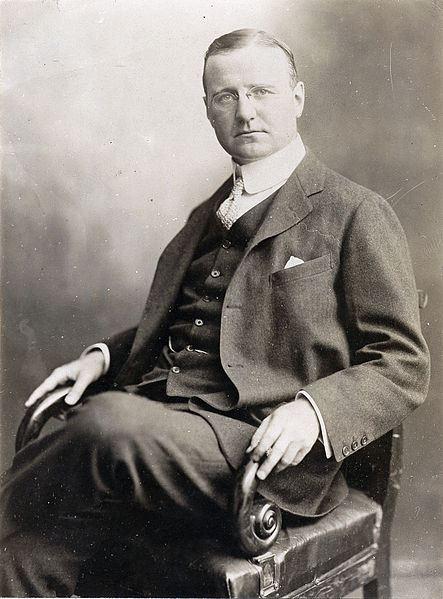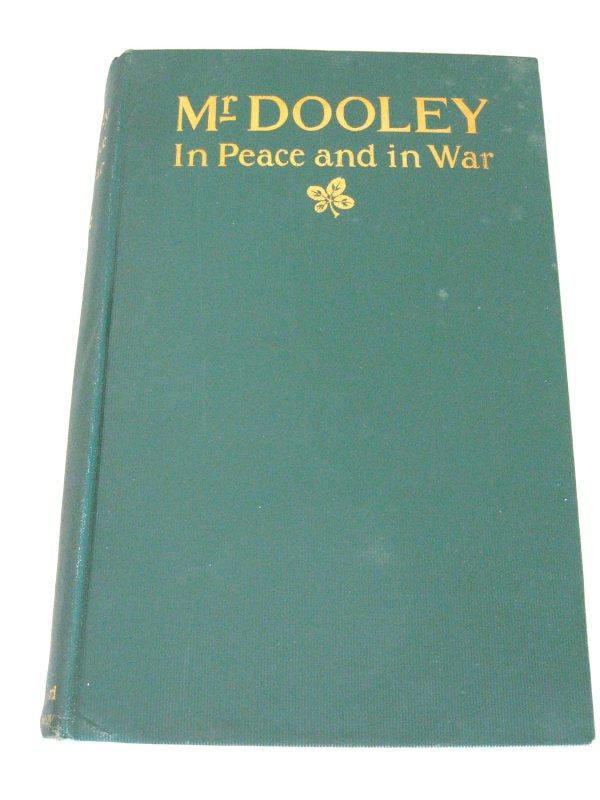Luke Dietrich
Finley Peter Dunne was a second-generation Irish American, born in 1867 and schooled in Chicago journalism alongside such late-nineteenth century writers as George Ade and Theodore Dreiser.

Throughout his life, Dunne took his non-fiction journalism, maintaining hopes to publish his own newspaper. But he became most famous for writing his “Mr. Dooley” columns, a series of fictional pieces narrated from the perspective of the title bartender, Martin Dooley. In 600-800 word sketches – in comedic, Irish vernacular – Mr. Dooley offered everyday advice and political opinions to his South Side Chicago clientele.
These weekly articles, initially popular with Chicago’s Irish communities, became widely syndicated when Dunne turned to national politics, satirizing the Spanish-American War. As Dunne’s chief biographer, Elmer Ellis notes, the first Mr. Dooley book collection sold over 100,000 copies from 1899 to 1900. Booksellers ordered more than 25,000 copies of Dunne’s second collection, Mr. Dooley in the Hearts of his Countrymen, before it was even published. Dunne’s writing was admired by Henry James and Edith Wharton, as she describes it in her autobiography A Backward Glance. Dunne was even influential for Langston Hughes’s invention of Jesse B. Semple.
The piece below is taken from Dunne’s first book collection, Mr. Dooley in Peace and in War.
 The book itself is divided into two sections: “Mr. Dooley in War” and “Mr. Dooley in Peace.” This column, “On The Indian War,” is paradoxically included in the second section. It gives a good sense, not only of Mr. Dooley’s humor and Irish brogue, but of his complex response to American politics and race relations.
The book itself is divided into two sections: “Mr. Dooley in War” and “Mr. Dooley in Peace.” This column, “On The Indian War,” is paradoxically included in the second section. It gives a good sense, not only of Mr. Dooley’s humor and Irish brogue, but of his complex response to American politics and race relations.
“On The Indian War”
“Gin’ral Sherman was wan iv th’ smartest we iver had,” said Mr. Dooley. “He said so manny bright things. ‘Twas him said, ‘War is hell’; an’ that’s wan iv th’ finest sayin’s I know annything about. ‘War is hell’: ‘tis a thrue wurrud an’ a fine sentiment. An’ Gin’ral Sherman says, ‘Th’ on’y good Indyun is a dead Indyun. An’ that’s a good sayin’, too. So, be th’ powers we’ve started in again to improve th’ race; an’, if we can get in Gatlin’ guns enough before th’ winter’s snows, we’ll tur-rn thim Chippeways into a cimitry branch iv th’ Young Men’s Christyan Association. We will so.
“Ye see, Hinnissy, th’ Indyun is bound f’r to give way to th’ onward march iv white civilization. You an’ me, Hinnissy, is th’ white civilization. I come along, an’ I find ol’ Snakes-in-his-Gaiters livin’ quite an’ dacint in a new frame house. Thinks I, ‘‘Tis a shame f’r to lave this savage man in possession iv this fine abode, an’ him not able f’r to vote an’ without a frind on th’ polis force.’ So says I: ‘Snakes,’ I says, ‘get along,’ says I. ‘I want ye’er house, an’ ye best move out west iv th’ thracks, an’ dig a hole f’r ye’erseilf,’ I says. ‘Divvle th’ fut I will step out iv this house,’ says Snakes. ‘I built it, an’ I have th’ law on me side,’ he says. ‘F’r why should I take Mary Ann, an’ Terence, an’ Honoria, an’ Robert Immit Snakes, an’ all me little Snakeses, an’ rustle out west iv th’ thracks,’ he says, ‘far fr’m th’ bones iv me ancestors,’ he says, ‘an beyond th’ water-pipe extinsion,’ he says. ‘Because,’ says I. ‘I am th’ walkin’ dilygate iv white civilization,’ I says. ‘I’m jus’ as civilized as you,’ says Snakes. ‘I wear pants,’ he says, ‘an’ a plug hat,’ he says. ‘Ye might wear tin pair,’ says I, ‘an’ all at wanst,’ I says, ‘an’ ye’d still be a savage,’ says I; ‘an’ I’d be civilized,’ I says, ‘if I hadn’t on so much as a bangle bracelet,’ I says. ‘So get out,’ says I. ‘So get out,’ says I, ‘f’r th’ pianny movers is outside, r-ready to go to wurruk,’ I says.
“Well, Snakes he fires a stove lid at me; an’ I go down to th’ polis station, an’ says I, ‘Loot,’ I says, ‘they’se a dhrunken Indyun not votin’up near th’ mills, an he’s carryin’ on outrageous, an’ he won’t let me hang me pitchers on his wall,’ says I. ‘Vile savage,’ says th’loot, ‘I’ll tache him to rayspict th’ rules iv civilization,’ he says. An’ he takes out a wagon load, an’ goes afther Snakes. Well, me frind Snakes gives him battle, an’, knowin’ th’ premises well, he’s able to put up a gr-reat fight; but afther a while they rip him away, an’ have him in th’ pathrol wagon, with a man settin’ on his head. An’ thin he’s put undher bonds to keep the peace, an’ they sind him out west iv th’ thracks; an’ I move into th’ house, an’ tear out th’ front an’ start a faro bank. Some day, whin I get tired or th’ Swedes dhrive me out or Schwartzmeister makes his lunch too sthrong f’r competition, I’ll go afther Snakes again.
“Th’ on’y hope f’r the Indyun is to put his house on rollers, an’ keep a team hitched to it, an’ whin he sees a white man, to start f’r th’ settin’ sun. He’s rooned whin he has a cellar. He ought to put all th’ plugged dollars that he gets from th’ agent an’ be pickin’ blueberries into rowlin’ stock. If he knew anything about balloons, he’d have a chanst; but we white men, Hinnissy, has all th’ balloons. But, anyhow, he’s doomed, as Hogan says. Th’ onward march iv th’ white civilization, with morgedges an’ other modhern improvements, is slowly but surely, as Hogan says, chasin’ him out; an’ th’ last iv him’ll be livin’ in a divin’-bell somewhere in th’ Pac-ific Ocean.”
“Well,” said Mr. Hennessy, the stout philanthropist, “I think so, an’ thin again I dinnaw. I don’t think we threat thim r-right. If I was th’ gover’mint, I’d take what they got, but I’d say, ‘Here, take this tin-dollar bill an’ go out an’ dhrink ye’ersilf to death,’ I’d say. They ought to have some show.”
“Well,” said Mr. Dooley, “if ye feel that way, ye ought to go an’ inlist as an Indyun.”
Luke Dietrich is a Doctoral Candidate at the University of New Hampshire, specializing in American Literature after the Civil War and the history of the book. Luke’s dissertation, which will include a chapter on Finley Peter Dunne, examines relationships between ethnic authors and mainstream publishers at the turn of the twentieth century.
